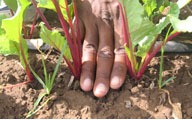
Empowering Community Members to Better Manage Their Natural Resources
The mountainous terrain, rocky soil and frequent droughts have made agricultural production a difficult endeavor in Cape Verde. From 1992-2007, in order to help the country meet its food requirements, ACDI/VOCA worked to empower Cape Verde farmer groups and community associations to manage their own natural resources, boost agricultural productivity, diversify crops and increase rural household incomes.
ACDI/VOCA’s 2002-2007 activities in Cape Verde were funded by the USAID PL 480 Title II monetization program. The monetization of U.S. wheat and corn allowed ACDI/VOCA to undertake various project activities valued at over $18 million to improve livelihoods among rural populations in Cape Verde. Activities focused on
- increasing the availability of agricultural products through natural resource management, such as the construction of soil and water conservation works and introduction of new technologies such as drip irrigation
- encouraging the development of an active and dynamic microfinance sector and increasing access to credit
- promoting better dietary practices
ACDI/VOCA successfully achieved its main objectives while also fostering the development of a complex network of client-driven service organizations dedicated to reducing poverty and food insecurity. All activities strengthened the organizational capacity and business skills of various community-based civil-society organizations, including formal community associations, women’s groups and informal farmer groups.
Natural Resource Management
ACDI/VOCA helped community associations develop into sustainable entities to effectively manage contracts for the construction of soil and water conservation works and for forestry activities. In the short term, this engagement provided rural families with an added source of income and valuable construction and management skills. By managing their soil and water conservation and forestry contracts effectively, community associations reduced environmental degradation and earned profits to invest in other community income-generating and social activities. In the long term, these works increased the availability of water for agricultural production during drought periods by improving infiltration of water into the soil and increasing the rate at which wells recharge. They also helped minimize soil erosion and boost crop yields.
As part of ACDI/VOCA’s promotion of better natural resource management, drip irrigation technology was introduced to maximize the benefit of limited water resources and increase horticultural production. Farmers using drip irrigation reported significantly higher incomes and production levels. Fresh fruits and vegetables, once scarce commodities, became available year round, providing important sources of nutritious food. ACDI/VOCA also assisted community associations and producer groups using drip irrigation in developing their capacity to market members’ produce more effectively.
Microfinance
After creating a successful and profitable microfinance program in 1997-2001, which was transferred to a local bank to assure its sustainability, ACDI/VOCA helped local microfinance institutions (MFIs) develop their own loan management and accounting systems. Local MFIs provide loans to finance a range of productive activities. One important linkage to ACDI/VOCA’s agricultural activities was that many loans focused on providing farmers with access to credit for upgrading their farms and using drip irrigation systems. ACDI/VOCA also worked with the local MFIs to increase their capacity to provide quality financial services and technical training for these specialized customers.
Nutrition Education
ACDI/VOCA promoted better dietary practices through nutrition awareness training, coordinated crop production and product transformation. ACDI/VOCA conducted activities specifically with women’s groups to produce vegetable and fruit products with extended shelf life. These products, sold in the local market, increased the income of rural women and the availability of fruits and vegetables in the marketplace throughout the year. ACDI/VOCA also partnered with the Cape Verde Ministry of Health in a joint effort to build the ministry’s capacity to monitor the nutritional status of children and assisted with media campaigns aimed at improving the nutrition of the population of Cape Verde.
Close-Out
ACDI/VOCA’s presence in Cape Verde came to an end on April 30, 2008. During this time, ACDI/VOCA witnessed an incredible transformation of the country as a result of both the program and a variety of external factors. ACDI/VOCA is proud to have contributed to the country’s growth and enhanced food security and is grateful for the opportunity to work with the wonderful people of Cape Verde over the years.
PDF version of profile (662 KB).





